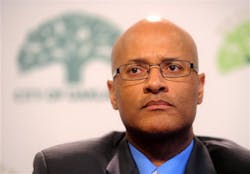OAKLAND, Calif. -- City leaders rejected calls Monday to declare a state of emergency over a surge in violent crime they say is being driven by two warring criminal gangs.
The gangs, which authorities refused to name, are responsible for about 90 percent of Oakland's shootings, robberies and murders since summer, including four of this year's six homicides, police Chief Howard Jordan said.
Using Jordan's estimates, the criminal groups had committed about 2,000 robberies and 65 homicides in the second half of last year. Jordan refused to estimate the membership totals in both groups.
City leaders spoke Monday after a brutally violent weekend that saw 15 people shot over the course of 60 hours, four of them fatally in separate incidents on Friday.
The shootings prompted discussions in City Hall about declaring a state of emergency, and Vice Mayor Larry Reid openly called for it Saturday, citing a lack of police officers to deal with rising violence.
But Jordan and Mayor Jean Quan said there was no benefit currently in declaring a state of emergency because the city was already getting the same level of help from outside police agencies that the declaration would trigger.
"We understand it's an emergency," Quan said. "We have called for assistance and gotten assistance from everybody we have asked so far, and we'll be asking for more over the next few weeks."
Jordan said police had made one arrest in connection with Friday's fatal
shooting in the 3400 block of West Street and arrested three other "persons of interest" potentially connected to Friday's shootings.
Police in recent days have pinned the city's violence on two rival criminal groups that began sparring over the killing of a woman last summer. But Monday was the first time Jordan said that the two groups were responsible for such a large percentage of violent crime in Oakland.
The groups "grow almost every week," and one of them has merged with other
violent groups, Jordan said.
Police targeted one of the groups during a coordinated sweep Friday morning, just hours before the four shooting deaths later in the day. Jordan said there was no indication the two actions were related. He promised additional crackdowns.
"We are going to be relentless; we are going to be aggressive, and we are going to bring them to justice," he said.
Oakland is suffering from the twin plagues of rising crime and a shrinking police force.
Violent crime in Oakland jumped 23 percent last year while the police department wilted under the weight of retirements and resignations to just 612 officers, its lowest staffing level in over a decade. Oakland officers are being forced to work overtime just to fully staff beats.
A declaration, if approved by the governor, would allow the state to pay for help from outside law enforcement agencies. It also would empower the city to impose a curfew in specific areas "to preserve the public order and safety."
"No one seems to understand that this is a crisis and that we have to reach out as far as we can to make this city a safer place," Reid said.
He hoped a declaration would force nearby cities to provide officers to respond to service calls in Oakland.
The City Council can make an emergency declaration independent of the mayor, but it's not clear whether there's enough support. Councilmembers Noel Gallo and Libby Schaaf both said Monday they needed more information before considering it.
Oakland is already getting assistance from the California Highway Patrol, as well as nearby school district and housing authority police, officials said. The CHP assistance is scheduled to end later this month, but Quan said the city expected to receive an extension. She also said she would be seeking additional federal aid to help get guns off city streets.
The City Council is considering contracting out for deputies from the Alameda County Sheriff's Office, who could help bridge the gap until the department's first batch of new recruits complete their field training this summer.
City leaders have gotten in hot water recently for making strong statistical claims about crime. Last year, Quan had to
retract a key underpinning of her crime plan, which incorrectly held that 90 percent of homicides and shootings had been occurring within a highly concentrated 100 blocks of the city.
Jordan said that police have improved intelligence on the two criminal groups and that the department has begun concentrating officers at locations where police anticipate retaliatory shootings will occur.
"We have done a very good job of identifying them," he said. "Now our job is to focus and bring them to justice."
Copyright 2013 - Contra Costa Times
McClatchy-Tribune News Service



